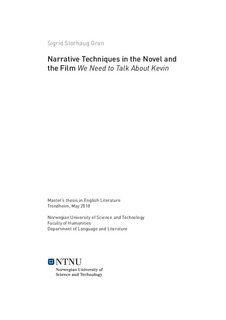Narrative Techniques in the Novel and the Film We Need to Talk About Kevin
Master thesis
Permanent lenke
http://hdl.handle.net/11250/2575133Utgivelsesdato
2018Metadata
Vis full innførselSamlinger
Sammendrag
This is a study of Lionel Shriver’s novel We Need to Talk About Kevin, and Lynne Ramsay’s film adaptation with the same title. The aim of this thesis is to examine and compare the ways in which these two works relate the story about Kevin. This is not an attempt at measuring the film’s fidelity towards the novel, or to establish any rules about medium-specificity. Rather, the aim is simply to explore the ways in which the film adaptation transforms the narrative situation of the novel. McFarlane states that it is “narrative that makes the two mediums seem compatible, whereas it is in narration that their secret hostility may lie” (2010, p. 19). As a response to this, the thesis studies differences and similarities in the two works’ plot, structure, and narration, discussing possible effects of certain features within these areas. The study finds that the film adaptation includes a very similar structure to that of the novel. Concerning the narration, the adaptation uses a focalizer rather than a narrator like the novel. This results in a slight change of focus, moving from the narrator’s discourse and ways of expressions, to emotional experience, interaction, and consequences. At the same time, though, other means of expression in the film are found to have similar effects as certain features in the novel, for instance relating to issues of ambiguity, relationship with the past, sympathy, and maternity.
